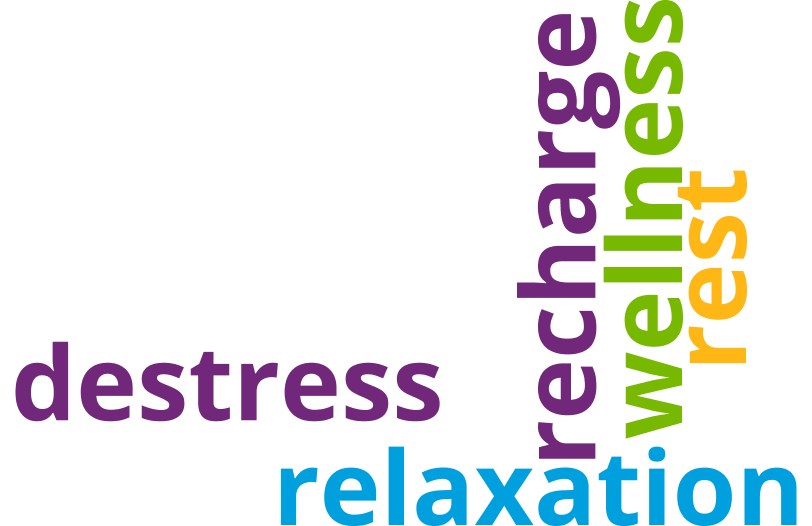Sharing the Journey: Rest and Relaxation
The Sharing the Journey series is by you and for you. In your own words, we highlight the perspectives and personal experiences of people who struggle with lupus each day.
This month, we asked Sharing the Journey participants the following question:
On days when you are feeling extra fatigued or stressed, what are your tips for recharging and/or relaxing?

I get tired a lot. I'm sure that's something many people with lupus can agree with. One thing I've learned is that being tired doesn't necessarily mean I need to sleep. Sometimes I do, but sometimes, I just need to be laying down (with or without my eyes closed). If I feel like I need my eyes closed because I'm that tired, I love to meditate. I use a meditation app, and I've grown to love it. It's helped me learn a great deal about myself and also how to relax in stressful situations. If I feel like I need to lay down but not sleep, again, my choices are based on symptoms. I love to read, but if I have a headache, that's out. I love to write, but also, headaches eliminate that choice. Netflix, HBOgo and Hulu are great to have. It's nice to be able to mentally escape if we can't physically escape what's going on with our bodies. – Nicole
I like to unplug from social media, try to catch up on some reading, and just take time for me. It can sometimes feel selfish to rest, or you run through the laundry list of things you have to do and feel that you can't relax. But honestly, it's better to rest when fatigued than when you are in a full-blown flare and your body forces you to rest. – Leslie
When I am feeling stressed and tired, primarily from going to school and working full-time, I try to have alone time in my room. I will sometimes turn on soft instrumental music, light candles, and take a nap. This technique always seems to work. I even sometimes talk about it with my friends or family to vent out my frustrations. – Kyra
I’ve said this before, but I’ll say it again. I call myself “the world’s worst rester.” I struggle with not doing something at all times. But sometimes lupus tells me to have several seats, and I do. A hot bath or shower, followed by fresh linens, hot tea, and TV or a book. This is how I de-stress and relax. When I’m extra fatigued, my body will shut down on its own and make me sleep for days. I try not to fight it when this happens, because I know at this point I can’t push any further. I’m stubborn, lupus is stubborn, but together we have figured out that the things above really work for me. – Kayla
On days where I am feeling extra fatigued or stressed, I tend to plan more. Recognizing the importance of resting for my body and mind, I reconfigure my day. I schedule more breaks to rest while evaluating what truly needs to be done that day. If something can be removed from my plate for that day, I will do so! It is important to understand it is okay to rest. You are not lazy and are truly fighting your hardest during your resting time. Rest and sleep are essential to feeling better. I encourage all to allow yourselves the opportunity to rest to ensure a better quality of life! – Angel
As a busy college student, prioritizing sleep is difficult. However, I've learned that I cannot fulfill my daily responsibilities if I get less than 6 hours of sleep. If I have a particularly active and hectic schedule, or if my body is feeling especially fatigued, I try to prioritize getting 7 hours of sleep. After I was diagnosed with lupus, I had to reorient my thinking. I have learned the importance of self-care, even if it means I miss the occasional assignment. During the day, if I am extremely fatigued, I try to take a nap (even 25 minutes makes a difference). If I cannot fully go to sleep, I at least try to spend some time resting on a couch or bed and simply reading or playing on my phone. If I do not have any time to sleep or rest, my last resort is caffeine. A chai tea latte at 4 pm can be just the boost you need to make it through your evening activities. I also rest by engaging in several stress relieving activities, such as coloring. Finding a way to disconnect from others and the world, even if for only 30 minutes, can do wonders to help reduce fatigue and relieve stress. – Becca
When it comes to overcoming stress and relaxing, people living with lupus have many tools available. Here are 4 ideas to try.
Sleep!
It’s important to get enough sleep and to rest during the day when you need to. But this can be a challenge. Read our tips for better sleep.
Yoga
Yoga may have multiple benefits for people with lupus, like reducing stress and improving sleep. Our guide has recommendations to help you figure out what type of yoga might work for you.
Meditation
Techniques like meditation, mindfulness, focused breathing, and guided imagery can help you relax. Try these tips to get started.
Physical activity
Physical activity can be a good stress reliever. Learn what you need to know before starting a new physical activity or regular exercise program, and talk to your doctor. Then check out these low-impact exercises for lupus.



